MPs rightly resisted an attempt to bounce them into blindly rubberstamping his deal writes Andrew Rawnsley in The Guardian
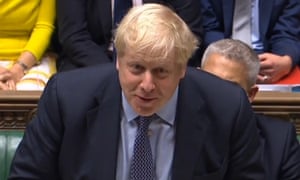
‘After his defeat he fixed a smile to his face and spoke as if “nothing has changed”.’ Photograph: -/PRU/AFP via Getty Images
Everything that could be done had been done to secure a victory for Boris Johnson on what had been billed as “Super Saturday”. He had come back from Brussels with his so-called “new deal” to the sound of the massed brass bands of the pro-Brexit media trumpeting praise for a “stunning achievement”/“personal triumph”/insert more sycophantic hyperbole here. Some European leaders tried to help him frame the choice before parliament as “new deal or no deal”. Suggestions that the EU might not grant another extension to the withdrawal date were designed to spook MPs into voting yes for fear of hurling Britain into a crash-out Brexit.
Cabinet ministers were deployed to “man-mark” any Conservative MP whose vote was doubtful. Heavy-breathing Tory whips said they were going to get “medieval” with rebels. The self-styled Tory Spartans, who would have spat out the Johnson deal as treachery if it had been presented by Theresa May, had fallen into line. Some of them had begun to see the ridiculousness of being Brexiters who never actually vote for Brexit.
Then there was the timetabling. To further ratchet up the pressure, the government staged the crackling drama of an “emergency” Saturday sitting of parliament, the first time that MPs had met at the weekend for nearly 40 years. This meant that everyone had an absurdly limited amount of time to get their heads around the latest tortuous iteration of Brexit. Concluding yesterday’s debate on behalf of the government, Michael Gove declared: “Our democracy is precious and this parliament is a special place.” They had a funny way of showing this supposed reverence for democracy and parliament. MPs were being asked to make a decision with huge consequences less than 48 hours after the deal had been unveiled. Were you able to conduct a confidential survey, guaranteeing to parliamentarians that their responses would remain anonymous, it is my strong suspicion that well under half of them have actually read the legal text and the rewritten political declaration. The government’s desperation to stampede parliament into signing off on the deal was further illustrated by its point-blank refusal to publish any analysis of its economic impact.
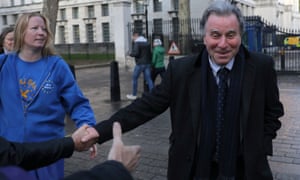
FacebookTwitterPinterest Oliver Letwin greets supporters in Whitehall after his amendment succeeded in the Commons. Photograph: Simon Dawson/Reuters
These tactics ultimately backfired. There was too much resistance to the attempt to bounce MPs into agreement. The debate was peppered with complaints that a prime minister who couldn’t be trusted was seeking a blank cheque from a parliament being kept in the dark. Justine Greening, the former Tory cabinet minister, tellingly complained that this was like being asked to buy a house without being allowed to see it.
By 322 to 306, a 16-vote defeat for Boris Johnson, MPs thwarted him by backing Sir Oliver Letwin’s amendment to withhold approval of the deal until MPs have had the chance to properly scrutinise the withdrawal legislation. For the prime minister, so-called Super Saturday turned into Squelched Saturday.
To understand why he was defeated, you first have to consider his deal. It bears no resemblance to the have-your-cake-and-eat-it promises peddled to the country by him and his fellow travellers during the referendum campaign in 2016. He succeeded in getting rid of the “backstop”, the element of the old deal so aggravating to the Tory Brexit ultras, but at the cost of inserting a frontstop that will keep Northern Ireland largely aligned with the single market and customs union for at least five years. The creation of an economic border down the Irish Sea made it impossible for him to gain the support of the Democratic Unionists. The other major difference with Mrs May’s deal is that it envisages moving to a much more distant relationship with Britain’s most important trading partners. The Johnson deal is one of the rock-hardest forms of Brexit. That diminished his chances of attracting support from Labour MPs.
In his speech to the Commons yesterday, the Tory leader said it was time to “move on”, a mantra parroted ad nauseam from the benches behind him. But as some of the more clued-up MPs observed, his deal does not “get Brexit done” at all. It covers only the divorce and a period of “transition”. Where Britain ultimately lands is still hugely uncertain. It is merely the prelude to a tougher stretch of bargaining about the terms of trade, customs, tariffs and standards with the EU. These negotiations come with another deadline attached. The cliff edge moves to the end of 2020. Caroline Lucas, the Green MP, put it wittily when she remarked that it was “a bad deal with a backdoor to a no deal.”
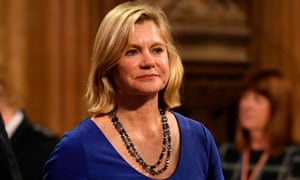
FacebookTwitterPinterest ‘Justine Greening, the former Tory cabinet minister, tellingly complained that this was like being asked to buy a house without being allowed to see it.’ Photograph: Daniel Leal-Olivas/AFP via Getty Images
The fundamental trouble with this deal is the same as with all the many versions of Brexit floated by two Tory prime minsters over the past three-plus years. None offers terms as favourable to the United Kingdom as remaining within the European Union. A study by the UK in a Changing Europe thinktank projects that the Johnson deal will shave up to 7% from the per capita income of Britons over a decade. Other forecasts are available. None of the credible ones suggests that Britain will be better off outside the EU.
There were other reasons why Mr Johnson could not assemble the coalition of support that he needed. The 10 votes of the Democratic Unionists played a decisive role in his defeat. They radiated the fury of people betrayed. Mr Johnson attended their party conference last year to pledge that “no British Conservative government could or should sign up to” regulatory checks and customs controls between Northern Ireland and the rest of the UK. Now he is pushing a deal that does this very thing.
Without the DUP, it was always going to be a very hard scrabble for the government to command a majority in the Commons. Its hopes depended on convincing enough Labour MPs to vote with the Tories. There is a band of Labour MPs who have their reasons for wanting to “get Brexit done”, but most had even more compelling reasons for not helping Mr Johnson to do it. He gave them less incentive to support him and more reason to distrust him by moving assurances on workers’ rights and environmental standards out of the binding withdrawal agreement and into the non-binding political declaration. His behaviour in his 88 febrile days as prime minister made it yet harder for Labour MPs to lend him their support.
The unlawful prorogation of parliament and the use of incendiary language to attack parliamentarians alienated some of the very Labour MPs he needed to persuade. The fact that it was a Johnson deal was a very big problem for them. The intense loathing he arouses among Labour people is much more visceral than their feelings about Theresa May. It is a very big step for a Labour MP to enable a Tory prime minister, especially when an election is looming. When that Tory prime minister is Boris Johnson, it proved just too much.
'Those hoping to take the question back to the people have more time to convince parliament to embrace a fresh referendum.
In response to his defeat, the prime minister rose to the dispatch box, fixed a smile to his face and spoke as if, to use a phrase made notorious by his predecessor, “nothing has changed”. Of course, quite a lot has changed. By the time you read this, the government will have sent a letter to the EU requesting an extension to the Brexit deadline, something Mr Johnson has repeatedly sworn he would never do, or he will be in breach of the law.
His deal is not necessarily dead. He mustered 306 votes, 20 more than Mrs May ever got for her deal. This leaves him 14 short of what he needs for a majority. Some of the MPs who defied him over the Letwin amendment, including Sir Oliver himself, have said they will support the government when it comes to votes on the Brexit legislation. There’s not much doubt, though, that the road ahead has become a great deal more rocky for Mr Johnson. Parliament will be able to seize the opportunity to subject his deal to the searching and detailed scrutiny that the government sought to evade yesterday. Pressure can be increased on ministers to reveal the true costs of the Johnson deal. Those hoping to take the question back to the people have more time to convince parliament to embrace a fresh referendum.
Boris Johnson called this special Saturday sitting in the hope that it would give him a reputation-boosting, momentum-building victory to flourish. He wanted to be able to claim that Brexit was done and dusted. Instead, Brexit is not done and he is dusted.
Much is in flux after another “historic” parliamentary vote that failed to settle Britain’s future. One thing is certain. Our long national nightmare continues.
By putting our bodies on the line and risking our liberty, we make this great neglected issue impossible to ignore writes George Monbiot in The Guardian
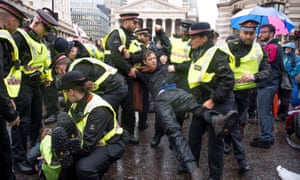
‘In the current wave of Extinction Rebellion protests, more than 1,400 people have so far allowed themselves to be arrested.’ Environmental activists are arrested in central London on Monday. Photograph: Ollie Millington/Getty Images
A few hours after this column is published, I hope to be in a police cell. I don’t yet know what the charge will be, where I will be arrested or when, but I know that if I go home this evening without feeling the hand of the law on my sleeve, I will have failed. This may sound like a strange ambition, but I believe it is a reasonable one.
If I succeed, I will be one of many. In the current wave of Extinction Rebellion protests, more than 1,400 people have so far allowed themselves to be arrested. It’s a controversial tactic, but it has often proved effective. The suffragettes, the Indian salt marchers, the civil rights movement and the Polish and East German democracy movements, to name just a few, all used it as a crucial strategy. Mass arrests are a potent form of democratic protest.
They work because they show that the campaigners are serious. When people are prepared to jeopardise their liberty for their cause, other people appear more likely to listen to what they say, and more likely to recognise its importance. Those who founded Extinction Rebellion researched these histories and sought to apply their lessons to the greatest predicament humanity has ever faced: the gathering collapse of our life support systems.
Nowhere on Earth does government action match the scale of the catastrophes we face. Part of the reason is the remarkably low level of public discussion and information on this crisis. Another is that the political risks of action are higher than the perceived rewards – a balance the protesters want to redress. But perhaps the most important factor is the brute power of the pollutocrats driving this disaster. As the Guardian’s The polluters series shows, the big fossil fuel companies have used political funding, intense lobbying and gross deceptions of the public to overwhelm environmental protections and keep harvesting their massive profits.
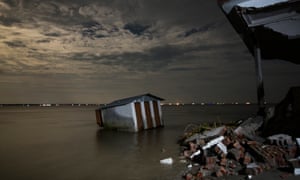
FacebookTwitterPinterest ‘Large numbers of people in Somalia, Mozambique, Bangladesh (above), the Caribbean and many other parts of the world are already losing their homes and livelihoods.’ Photograph: Zakir Hossain Chowdhury/Barcroft Media
Those who confront them have no such power. We cannot buy television channels and newspapers, pour billions into political lobbying or seed dark ads on social media. We have only one strength: our vulnerability. By putting our bodies on the line and risking our liberty, we make this great neglected issue impossible to ignore.
So far, the campaign has been remarkably successful. Alongside the youth climate strikes, Extinction Rebellion has changed the global conversation about climate and environmental breakdown. These movements are directly responsible for the declaration of a climate emergency by the UK parliament and many other political bodies. But this is not enough. It is one thing to recognise an emergency, another to act on it. We must do more. I cannot justifiably say “we” if I don’t mean “I”.
I know this action will expose me to criticism as well as prosecution. Like other prominent activists, I will be lambasted for hypocrisy: this is now the favoured means of trying to take down climate activists. Yes, we are hypocrites. Because we are embedded in the systems we contest, and life is complicated, no one has ever achieved moral purity. The choice we face is not between hypocrisy and purity, but between hypocrisy and cynicism. It is better to strive to do good, and often fail, than not to strive at all.
Other criticisms carry more weight. Extinction Rebellion is too white, and too middle class. Both charges are true, as the organisers recognise: they know that they must do more to break down the cultural barriers the movement unconsciously erects, engage with community leaders, and listen to voices that have not been heard.
But I cannot help who I am. I accept that the costs of arrest for people like me – a white, middle-class man with an established career – are lower than for other people. But this means I have a moral duty to use my privilege.
The victims of climate breakdown have so far been mostly voiceless and invisible to us. But we know that, even with just 1C of global heating, climate chaos is already a bigger cause of forced migration than either poverty or political oppression. Large numbers of people in Somalia, Mozambique, Bangladesh, the Caribbean, Central America and many other parts of the world are already losing their homes and livelihoods. The poor parts of the world are the least responsible for climate disaster but the most likely to suffer its effects. They carry the cost of our consumption. We have imposed this crisis on others, and must do what we can to curtail it.
Since I began writing this article, getting arrested has become easier: the police have imposed a blanket ban on “any assembly linked to the Extinction Rebellion autumn uprising” across London. This looks to me like a breach of article 20 of the Universal Declaration of Human Rights: “Everyone has the right to freedom of peaceful assembly and association.” Over the past four decades, the police have acquired an extraordinary array of powers – enabling them, in effect, to shut down any protest. But they deem even these insufficient: at a recent press conference they demanded new “banning orders” for “habitual” protesters. Given that regular protest has proved throughout history to be an essential mechanism for political reform, this looks like a direct attack on democracy.
Far from deterring me, the draconian ban this week and the police demand for even greater powers has strengthened my determination. Now I feel I am standing not only for the habitability of the planet but also for the continued right to protest. This is my duty, and I intend to fulfil it.
As Naga Munchetty’s experience at the BBC shows, challenging inflammatory language can be hazardous writes Priyamvada Gopal in The Guardian
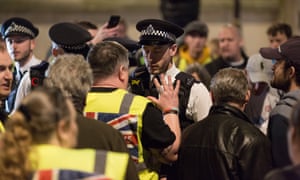
Brexit opponents clash. ‘Inflammatory language is increasingly the norm, yet the word racism remains muffled under a curious omerta.’ Photograph: Teri Pengilley/Guardian
Politicians accuse each other of being cowardly collaborators who surrender, betray and capitulate. Commentators on television warn of riots. Inflammatory language is increasingly the norm in public life, yet one word remains muffled under a curious omertà. The BBC presenter Naga Munchetty was only the latest to discover that describing something as racist, even in a measured way, can get you into a lot of trouble.
For many people of colour in largely white institutions, this is a familiar prohibition that works to shut down much-needed discussion and create a repressive and demoralising silence.
Racism is that strange phenomenon, apparent everywhere and apparently nowhere. People believe that not “seeing” race, or being “colourblind”, is progressive, when it is merely evasive. What might happen if we took it as given that after six centuries of European imperial rule it would be astounding if most of us – including people of colour – were not shaped by the racial hierarchies put in place? The term white supremacy may invoke images of hooded Klansmen burning crosses, but it actually refers to an entrenched system of racial domination that once justified colonisation and slavery, the legacies of which still shape economic, political and social orders, particularly in the west.

Racism is emphatically not a matter of subjective “experience”. It has objective structural force that can be identified not just in discriminatory practices but in differing entitlements and unequal access to resources, representation and opportunities. “Go back to where you came from” is not just a wounding phrase that almost all people of colour and migrants have heard. Its material consequences include actual expulsions such as those of the “Windrush children” and, of course, discriminatory travel, migration and citizenship policies.
Another way of deflecting engagement with race is to personalise matters. As the sociologist Robin DiAngelo notes, insisting that there was no “intent” to be racist or asking, “how can you say I’m racist, you don’t know me”, are manifestations of “white fragility”. In this scheme, only exceptionally “bad” people can be racist, and therefore the mere suggestion of racism is often treated as more serious and hurtful than racism itself. DiAngelo makes the important point that discussions about race are bound to be uncomfortable for members of dominant communities who have to come to terms with their own entanglement in an unfair system.
To avoid such discomfort and difficulty is to refuse change. I know this from personal experience as an upper-caste woman from India who has also benefited from a deeply iniquitous system. I too have felt defensive, but there’s no way to change things without admitting to the existence of caste or race supremacy, and dealing with the fact of inevitable complicity and the inherited privilege that disadvantages others.
At the same time, “whataboutery” leads nowhere. Whenever I speak of race and empire in the British media, I receive emails asking: “What about caste” and inviting me to “go back” to India to address the caste system instead. People not normally known for a deep interest in class matters will also suddenly ask “what about the working classes?”. A now retired female manager once told me that, although sexism was still an issue at Cambridge University, racism was not. There’s no need to pit race, class, caste, gender, ability or sexuality against each other: there are no free passes in an inequitable world where each brutality shapes the others.
There are also no “race cards”. People who raise issues of racial exclusion or abuse are not demanding special treatment; on the contrary, they are arguing against the special privileges bestowed on the majority or dominant group. Most of us who raise issues of racism do so with hesitation, feeling vulnerable as we do so and fearing inevitable social and institutional reprisals. Meet a race whistleblower and you meet a deemed “troublemaker”, a position with unpleasant institutional consequences.
Discussion of race is often derailed by bogeys such as “reverse racism”. Of course it’s possible for people of colour to display hostile or denigrating attitudes towards other races, Asian anti-blackness being one example. “Racism towards white people” is not, however, systemic and does not have policy consequences. Certificates from “best friends” of colour declaring a person to be “not racist” are also void. Just as having a mother does not make men free of sexism in a patriarchal world, having a black best friend, spouse or even child cannot absolve individuals from complicity in racist language and actions. Indeed, ethnic minority politicians may themselves be used to justify such things as blackface or xenophobia.
No one is claiming that victims of racism are pure or noble. People are never purely victims and everyone has to ask tough questions of themselves. It is perfectly possible, for example, to be at once homophobic yourself and a victim of racism. Both must be tackled.
Far from “wallowing in victimhood”, people who challenge racism are acting as responsible agents of change. At a time when the forces of violent racism are globally in the ascendant once again, we can help them along by refusing to name it as such.
Alternatively, we can do the right thing: actively acknowledge racism’s existence and try to rein in its power. If we don’t choose to have difficult and urgent discussions openly, then “diversity” will remain a meaningless buzzword where people’s bodies are included in institutions but their voices are silenced.
A determined ignorance of the dynamics of global capitalism is bringing about a long-overdue audit of British realities writes David Edgerton in The Guardian
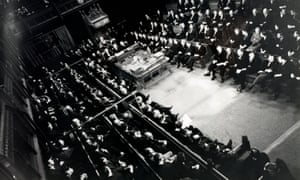
The Commons in 1966: ‘The Conservative party was the party of national capitalism.’ Photograph: Bentley Archive/Popperfoto via Getty Images/Getty Images
Who backs Brexit? Agriculture is against it; industry is against it; services are against it. None of them, needless to say, support a no-deal Brexit. Yet the Conservative party, which favoured European union for economic reasons over many decades, has become not only Eurosceptic – it is set on a course regarded by every reputable capitalist state and the great majority of capitalist enterprises as deeply foolish.
If any prime minister in the past had shown such a determined ignorance of the dynamics of global capitalism, the massed ranks of British capital would have stepped in to force a change of direction. Yet today, while the CBI and the Financial Times call for the softest possible Brexit, the Tory party is no longer listening.
Why not? One answer is that the Tories now represent the interests of a small section of capitalists who actually fund the party. An extreme version of this argument was floated by the prime minister’s sister, Rachel, and the former chancellor Philip Hammond – both of whom suggested that hard Brexit is being driven by a corrupt relationship between the prime minister and his hedge-fund donors, who have shorted the pound and the whole economy. This is very unlikely to be correct, but it may point to a more disconcerting truth.
The fact is that the capitalists who do support Brexit tend to be very loosely tied to the British economy. This is true of hedge funds, of course – but also true for manufacturers such as Sir James Dyson, who no longer produces in the UK. The owners of several Brexiter newspapers are foreign, or tax resident abroad – as is the pro-Brexit billionaire Sir James Ratcliffe of Ineos.
But the real story is something much bigger. What is interesting is not so much the connections between capital and the Tory party but their increasing disconnection. Today much of the capital in Britain is not British and not linked to the Conservative party – where for most of the 20th century things looked very different. Once, great capitalists with national, imperial and global interests sat in the Commons and the Lords as Liberals or Conservatives. Between the wars, the Conservatives emerged as the one party of capital, led by great British manufacturers such as Stanley Baldwin and Neville Chamberlain. The Commons and the Lords were soon fuller than ever of Tory businessmen, from the owner of Meccano toys to that of Lyons Corner Houses.
After the second world war, such captains of industry avoided the Commons, but the Conservative party was without question the party of capital and property, one which stood against the party of organised labour. Furthermore, the Tories represented an increasingly national capitalism, protected by import controls, and closely tied to an interventionist and technocratic state that wanted to increase exports of British designed and made goods. A company like Imperial Chemical Industries (ICI) saw itself, and indeed was, a national champion. British industry, public and private, was a national enterprise.
Since the 1970s things have changed radically. Today there is no such thing as British national capitalism. London is a place where world capitalism does business – no longer one where British capitalism does the world’s business. Everywhere in the UK there are foreign-owned enterprises, many of them nationalised industries, building nuclear reactors and running train services from overseas. When the car industry speaks, it is not as British industry but as foreign enterprise in the UK. The same is true of many of the major manufacturing sectors – from civil aircraft to electrical engineering – and of infrastructure. Whatever the interests of foreign capital, they are not expressed through a national political party. Most of these foreign-owned businesses, not surprisingly, are hostile to Brexit.
Brexit is the political project of the hard right within the Conservative party, and not its capitalist backers. In fact, these forces were able to take over the party in part because it was no longer stabilised by a powerful organic connection to capital, either nationally or locally.
Brexit also speaks to the weakness of the state, which was itself once tied to the governing party – and particularly the Conservatives. The British state once had the capacity to change the United Kingdom and its relations to the rest of the world radically and quickly, as happened in the second world war, and indeed on accession to the common market.
Today the process from referendum to implementation will take, if it happens, nearly as long as the whole second world war. The modern British state has distanced itself from the productive economy and is barely able to take an expert view of the complexities of modern capitalism. This was painfully clear in the Brexit impact sectoral reports the government was forced to publish – they were internet cut-and-paste jobs.
The state can no longer undertake the radical planning and intervention that might make Brexit work. That would require not only an expert state, but one closely aligned with business. The preparations would by now be very visible at both technical and political levels. But we have none of that. Instead we have the suggestion that nothing much will happen on no deal, that mini-deals will appear. The real hope of the Brexiters is surely that the EU will cave and carry on trading with the UK as if nothing had changed. Brexit is a promise without a plan. But in the real world Brexit does mean Brexit, and no deal means no deal.
Brexit is a necessary crisis, and has provided a long overdue audit of British realities. It exposes the nature of the economy, the new relations of capitalism to politics and the weakness of the state. It brings to light, in stunning clarity, Brexiters’ deluded political understanding of the UK’s place in the world. From a new understanding, a new politics of national improvement might come; without it we will remain stuck in the delusional, revivalist politics of a banana monarchy.







